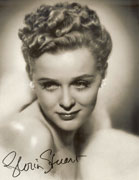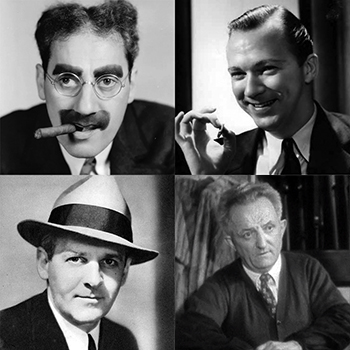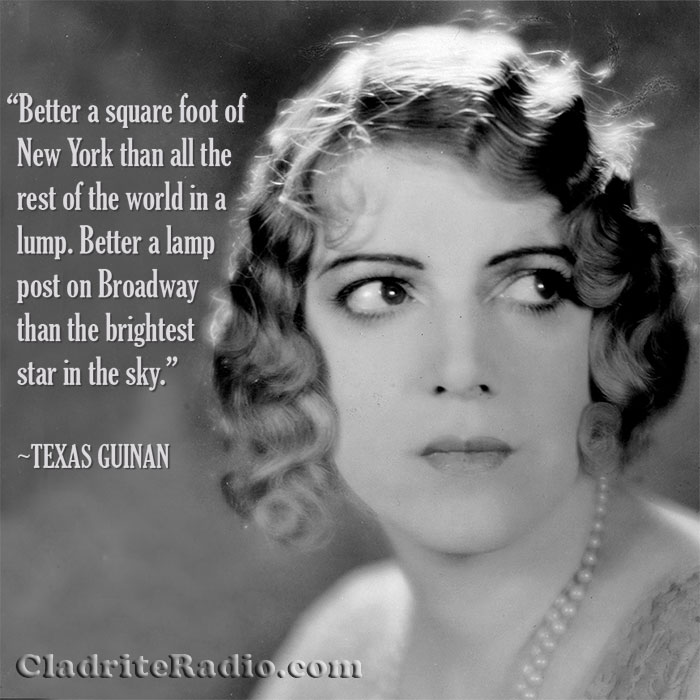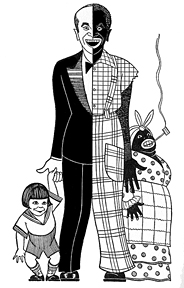Here are 10 things you should know about Edward Arnold, born 133 years ago today. One of Hollywood’s finest character actors, he specialized in playing men of authority, influence and wealth.
Tag: Walter Winchell
Remembering Gloria Stuart on Her Birthday
Gloria Stuart was born on Independence Day, 1910, in Santa Monica, California. In 1999, when she was just a kid of 89, we got to interview her on the occasion of the publication of her memoir, I Just Kept Hoping. The interview was conducted over the telephone, though we did get the chance to meet Ms. Stuart when she came to NYC for her book party.

We considered it quite a thrill, we don’t mind telling you, to get to interact with Ms. Stuart. After all, this is the women who starred opposite Claude Rains in James Whale‘s The Invisible Man, who appeared with Boris Karloff, Melvyn Douglas, and Charles Laughton in The Old Dark House, who worked with greats such as Irene Dunne, Ralph Bellamy, Pat O’Brien, Lionel Barrymore, Lee Tracy, Nancy Carroll, Frank Morgan, Paul Lukas, Edward Arnold, Eddie Cantor, Ruth Etting, and dozens more.
So, to celebrate her 111th birthday, we thought we’d share the interview we did with her in 1999. Enjoy!
It’s been a long, eventful life for former and current movie star Gloria Stuart. She had her first go-around at stardom in the Hollywood heyday of the 1930s and ’40s; then, after taking off 30 years or so to pursue painting, travel, and political activism, she again began to act in the 1970s, eventually garnering a Best Supporting Actress nomination for her role in Titanic. Still going strong today at the age of 89, Stuart has now added authorship to her list of achievements. Her candid memoir, I Just Kept Hoping, is peppered with anecdotes about such memorable figures as Shirley Temple, Groucho Marx, Dorothy Parker, and J. Robert Oppenheimer, the father of the atomic bomb. We spoke to Gloria about her life, her two careers in the movies, and her secrets for living so long and so well.
An Interview with Gloria Stuart
You made three films with director James Whale: The Invisible Man, The Old Dark House, and The Kiss Before the Mirror. What can you tell us about him?
I’m very happy I was in those films. You know, James is a cult figure in England. There are a lot of James Whale fan clubs. Actually, right after I had read for Jim Cameron for Titanic, I had booked a month in London. I went right away, and there were two wonderful James Whale organizations that I met with. He’s getting his due now, thanks to Gods and Monsters.
What did you think of Gods and Monsters? Was it, in your view, an accurate portrayal of Whale?
Oh, yes, it was. Ian McKellan captured James’s elegance, the beautiful manners, the beautiful tailoring, the precision, the whole thing. Of course, no one could be James, but he came awfully close.
The special effects in The Invisible Man hold up remarkably well today for a film that was made in 1933.
Yes, people who see it today—it runs every so often—they say, gee, it’s not an old hat movie at all.
I’m wondering—did the processes that went into creating those special effects slow down the pace of moviemaking at all?
It was never evident. Only James and the cameraman and I guess all the process people at Universal—the rest of us never had any inkling of what was going on. We did do a lot of shooting in front of black curtains. Now, I wasn’t on the set when the bandages came off or anything like that, so I have no idea about that. But it was very, very secret. I wasn’t on the set when they were finagling the bandages off, and so forth.
That would’ve been fun to see.
Yes, it would’ve! Claude [Rains] may have known [how it all worked] but he never said so.
You and your second husband, Arthur Sheekman, were good friends with Humphrey Bogart and Mayo Methot, his wife at the time. What can you tell us about Bogie that we might not know?
Read More »
In Search of the Mysterious Mr. Moskowitz
 One of the joys of being an old-movie buff is when an actor in a bit part sparks your interest and you start to do a little research on him or her, which causes you to tumble down a rabbit hole of odd facts and coincidences. Sometimes one finds unlikely connections between that unfamiliar performer and some much bigger names—such as when, say, Groucho Marx, Lee Tracy, and Walter Winchell have a connection to…Milton Wallace?
One of the joys of being an old-movie buff is when an actor in a bit part sparks your interest and you start to do a little research on him or her, which causes you to tumble down a rabbit hole of odd facts and coincidences. Sometimes one finds unlikely connections between that unfamiliar performer and some much bigger names—such as when, say, Groucho Marx, Lee Tracy, and Walter Winchell have a connection to…Milton Wallace?
We recently attended a screening of Blessed Event (1932), a classic precode comedy in which Lee Tracy plays a character that was obviously inspired by gossip columnist Walter Winchell, who was all the rage back then.
We were especially excited to attend the screening, as we had been informed that some footage that had long since been excised from the picture had been restored. Reportedly, it had been there all along, but only in the print that belonged to the Library of Congress. Virtually no one knew about it till Bruce Goldstein, director of repertory programming at NYC’s Film Forum, screened the print at the TCM film festival and realized what a find he’d uncovered.
For those not familiar with Winchell, we’ll catch you up just a bit: A former vaudevillian, he turned to a scandal-mongering form of journalism when his performing career wound down. His popular newspaper column was syndicated and he had a huge following on national radio, too. He was known for coining any number of phrases still used today, including the above-cited “blessed event” used to signal the pending birth of a baby (the guardians of broadcasting decency in those days were convinced that American ears were too tender for that oh-so-coarse term “pregnant”).
Winchell’s broadcasts included remotely broadcast performances by bands and singers around the country, and right before switching to those remote locations, he would blow a siren whistle and say, “Okay, America!”
In the film, as the title suggests, Tracy’s Winchell-esque character relies on the same “blessed event” catchphrase that Winchell used. But in the restored scene, a short, middle-aged, somewhat stereotypical (though not, in our opinion, disparagingly so) Jewish man, played by one Milton Wallace, shows up at the newspaper office to give Tracy a “blessed event” tip: He, Mr. Moskowitz, and his wife are soon going to have their seventh child and he thinks maybe Tracy would want to put that into his column.
Happy 133rd Birthday, Texas Guinan!
Actress and Queen of the Nightclubs Texas Guinan was born Mary Louise Cecilia Guinan 133 years ago today in Waco, Texas. Here are 10 TG Did-You-Knows:
- Guinan was one of seven children. Her parents were Irish-Canadian immigrants. She attended parochial school at a Waco convent.
- When Guinan was 16, her parents moved the family to Denver, Colorado. There she began to appear in amateur stage productions before marrying newspaper cartoonist John Moynahan at age 20. The pair moved to Chicago, where she studied music. She eventually divorced Moynahan and began to perform in vaudeville as a singer.
- Guinan’s singing was reportedly no great shakes, but she had lots of pep and she soon found that she improved her prospects as a performer by regaling the audience with (perhaps exaggerated) tales of her “Old West” upbringing.
- In 1906, Guinan moved to New York City, where she worked as a chorus girl before finding additional work in vaudeville and on the New York stage.
- In 1917, Guinan made her movie debut and soon was a regular in western pictures. She is said to have been the first movie cowgirl (her nickname was The Queen of the West). Guinan would go on to appear in more than 50 features and shorts before she died in 1933.
- With the passage of the 18th Amendment, Guinan became active in the speakeasy industry, serving as hostess and emcee for a long string of illicit (but very popular) nightspots. Her outsized, sassy personality and her skill at evading justice, despite her many arrests for operating a speakeasy, made her a legendary figure in Prohibition-era NYC.
- Guinan’s speakeasies featured an abundance of scantily clad fan dancers and showgirls, but her penchant for pulling the legs of the rich and famous served her just as well. “Hello, suckers!” became her standard exclamation for greeting customers. Her well-to-do patrons she referred to as her “butter-and-egg men” and she coined the familiar phrase “Give the little ladies a big hand” while serving as emcee.
- Texas Guinan’s nightclubs were often backed by gangster Larry Fay and such legendary bad guys as Arnold Rothstein, Owney Madden and Dutch Schultz frequented her establishments—alongside relatively “good guys” such as George Gershwin, Walter Chrysler, Pola Negri, Mae West, Al Jolson, Gloria Swanson, John Gilbert, Clara Bow, Irving Berlin, John Barrymore and Rudolph Valentino.
- Ruby Keeler and George Raft both got their starts in show business as dancers as Guinan’s clubs, and Walter Winchell acknowledged that the inside access Guinan gave him to Broadway’s cornucopia of colorful characters helped launch his career as a gossip columnist.
- Guinan died of amoebic dysentery in 1933, one month before Prohibition was repealed. She was just 49. Bandleader Paul Whiteman and writer Heywood Broun were among her pallbearers.
Happy birthday, Texas Guinan, wherever you may be!

Times Square Tintypes: Al Jolson
AL’S HERE

